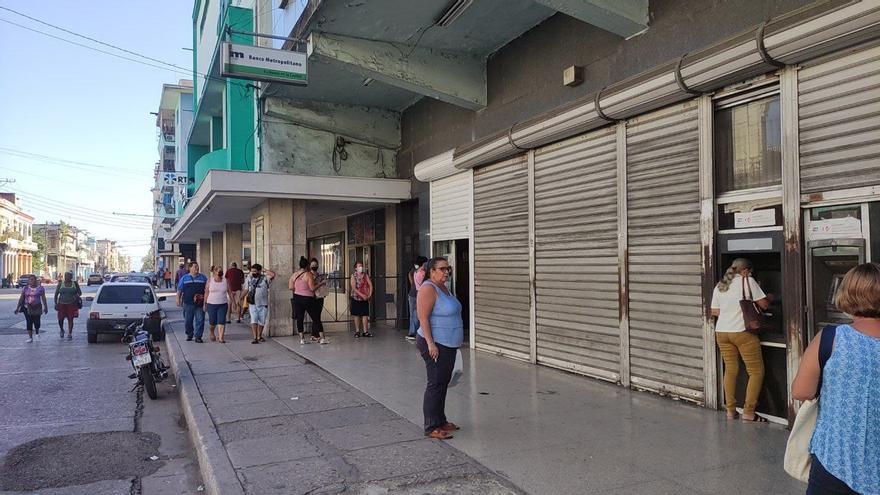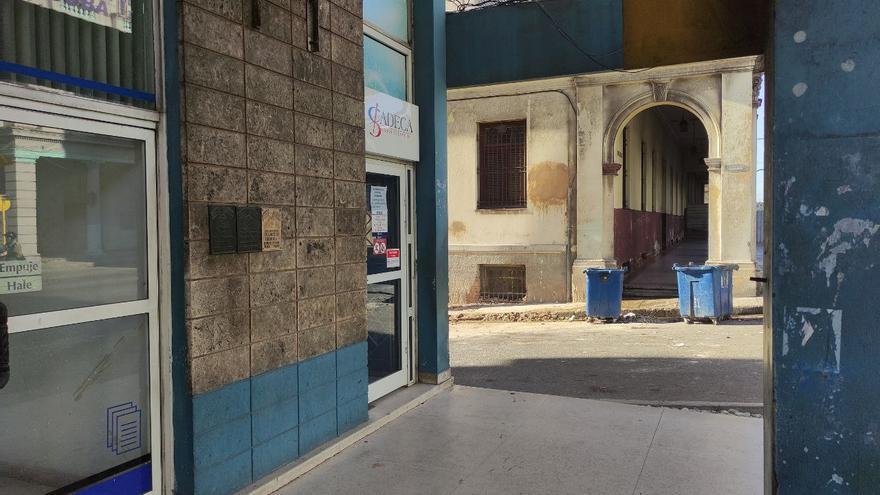
![]() 14ymedio, Juan Diego Rodríguez, Havana, 4 August 2022 — I took to the streets of Havana with ten dollars in my pocket. A sweaty, fought-for bill, a miniature fortune in the country of bank surprises. I wasn’t forgetting the words of the Minister of Economy, serene as an executioner between the president of the Central Bank and the affirmative Randy Alonso [note: director of the State TV Roundtable program].
14ymedio, Juan Diego Rodríguez, Havana, 4 August 2022 — I took to the streets of Havana with ten dollars in my pocket. A sweaty, fought-for bill, a miniature fortune in the country of bank surprises. I wasn’t forgetting the words of the Minister of Economy, serene as an executioner between the president of the Central Bank and the affirmative Randy Alonso [note: director of the State TV Roundtable program].
Wearing a tie and smartly dressed, Minister Alejandro Gil promised to exchange each of my dollars for 120 pesos, or something like that, because there would be a bite from the commission. I started walking towards Infanta wondering how many dollars Gil himself would sell, a man who claims to be always “in the concrete” and for whom “there are no magic recipes” when it comes to economics.
I arrived at the Cadeca currency exchange on Infanta, and I didn’t see any of the “talented young people” and the “professors of the academy” who enlightened the minister on managing this measure. I was greeted by a uniformed mulatto, older, who wore his uniform impeccably. “You saw the Roundtable yesterday, didn’t you?” he asked me kindly.
I answered yes and instantly the clerk appeared, nervous as a fire ant, and said to me: “Did you bring your identity card?” I couldn’t help but smile. So did Gil not only intend to open the banks as mousetraps to capture foreign currency, but also to learn who has dollars and how many they are willing to sell?
“I left it, compañera,” I said, and kept walking through Central Havana, willing to find out what other secret rules Alejandro Gil’s game would have in its first hours of operation.

He who makes the law makes the trap, as the saying goes. However, here everything is slippery, dark and doesn’t obey logical rules, I thought, as I went up Infanta to another bank. It was deserted: a few workers, fugitives from their posts during working hours, so as not to subject themselves to longer lines in the afternoon.
“Who is last in line* to exchange?” I asked them. They looked up, overwhelmed by the heat and boredom, and pointed to the door of the establishment. “The system isn’t working yet,” they informed me inside.
Like a monetary Eusebio Leal, I continued walking Havana up to Belascoaín and was received at the bank on the corner of Zanja by a distracted guard who didn’t even look up from his cell phone. “There is no one to exchange,” the guy explained, “because there is no connection. The system is down, you understand?”
I looked at the line in front of the ATMs, which were working perfectly, and I found the excuse very strange. They depend on the same network. The Central Bank of Cuba hasn’t been able to guarantee a serious and effective structure for exchanging currency, even when they feign “despair” and “anger” in the face of the U.S. embargo, the usual apology for incompetence.
“Come in, come on, exchange!” one of the office workers from another bank in Belascoaín appealed to me. As a preliminary step to a financial wound, so much enthusiasm seemed dangerous. “Has anyone come to exchange yet?” I asked cautiously.
No,” the woman admitted, “but there is no problem. You know what these things are like at first. The system still doesn’t work well; we have to try it. So you will be the first brave man, come on!” “Wait a minute,” I said, and I saved myself by shooting out of there like a rocket.
Finally, at the bank on Galiano Street, I found several people lining up to exchange. The employee at the door, a portent of economic misinformation, assured us that the exact exchange rate for the euro was 121 pesos, when in reality it stays at 119 and a few cents after paying the commission.
In the line, the story was already famous about clueless customers who, when extracting Cuban pesos with their European Visa card at the ATM, received 24 Cuban pesos for every euro and not at the new rate. It was useless for them to complain. A foolish boy arrived asking how much he would have to pay for a dollar. “No, mi amor,” clarified the bank guard, “they are the only ones who can buy. And they will sell . . . when they tell us.”

It’s almost noon, and Gil’s invention hasn’t convinced me, so I give up my place in Galiano’s line. Nor does it seem like a good deal for other Cubans. The minister has already imagined us in long lines to rid ourselves of foreign currency and destroy, with the same shot, the informal market.
I open my phone and consult the WhatsApp groups of buying and selling dollars, food, medicines and everything else. Contrary to Gil’s predictions, no one pays too much attention to the prodigious measure. Obviously, the exchange rate of the dollar is already exceeding that decreed by the government.
I note the contact for a boy who promises 150 pesos for every dollar. In the same group, someone says that they prefer to sell their dollars at 90 pesos rather than give them to the government. Since yesterday, both the euro and other freely convertible currency have been following the upward course of the U.S. currency, the favorite of the Council of Ministers.
I take my $10 bill out of my pocket and look at it almost fondly. What a job it will be for Alejandro Gil, the brilliant magician of the Cuban economy, to take dollars away from a Cuban.
*Translator’s note: When Cubans join a line they do so by asking “who’s last,” and in this way the line maintains its order without individuals having to stand exactly in place, in a line that might last hours.
Translated by Regina Anavy
____________
COLLABORATE WITH OUR WORK: The 14ymedio team is committed to practicing serious journalism that reflects Cuba’s reality in all its depth. Thank you for joining us on this long journey. We invite you to continue supporting us by becoming a member of 14ymedio now. Together we can continue transforming journalism in Cuba.
